Viewing analytics
The Dashboard places a significant focus on analytics, providing tools to monitor your integration and gather insights about visitors.
Overview Page
The Overview page serves as the homepage for the Dashboard, displaying key insights and metrics at a glance. The page features a row of selected key metrics, a timeline chart, and distribution lists. The page also features a date range filter, and an environment filter.
You can access the Overview page by visiting Dashboard > Overview.
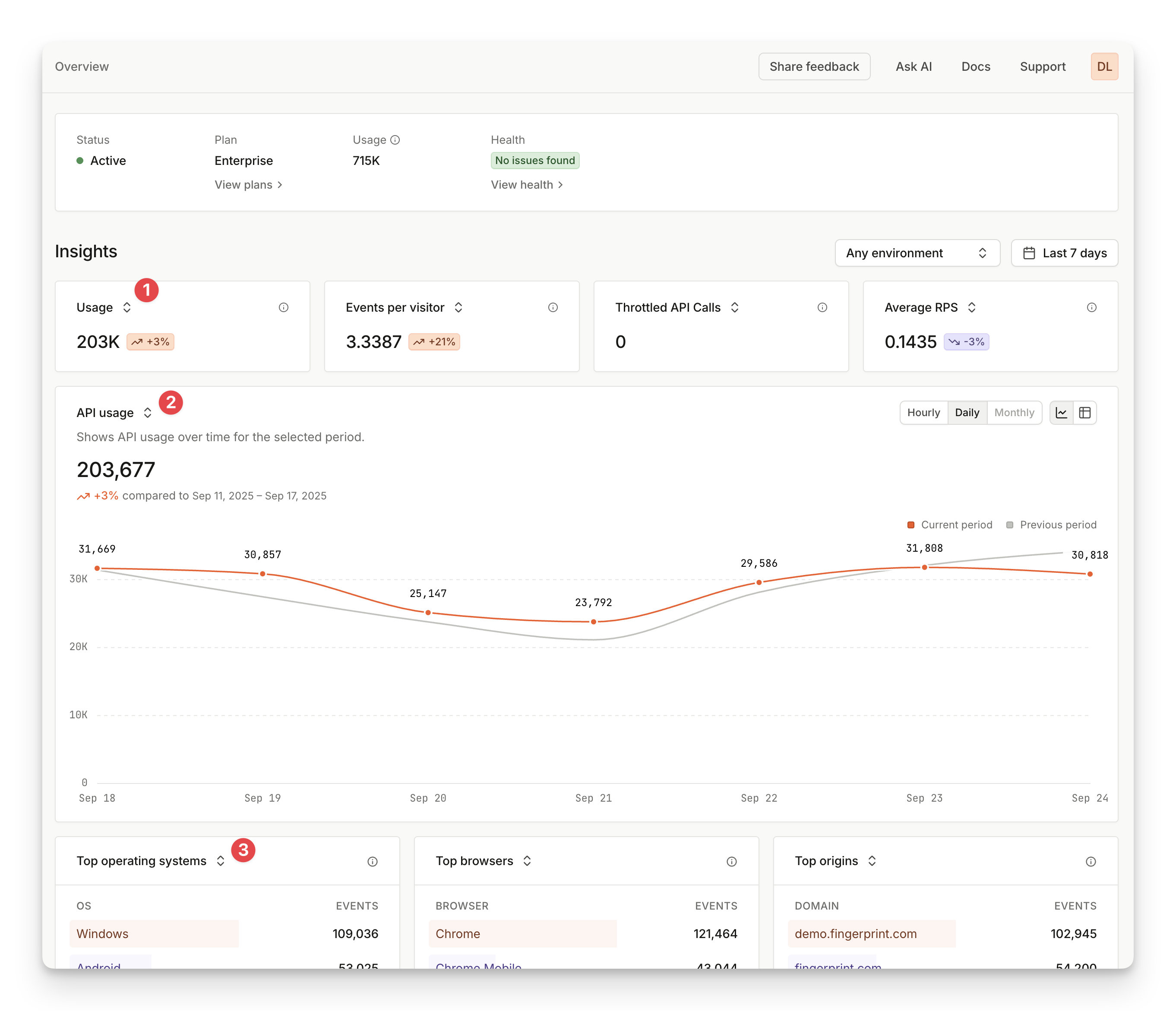
The key metrics (1) provide you with information and insights about your integration at a glance.
List of available key metrics
| Metric | Description |
|---|---|
| API usage | Number of identification requests made in the selected period |
| Number of unique visitors | Number of distinct visitor IDs seen in the selected period |
| Events per visitor ratio | Average number of identification events for every uniquely identified visitor |
| Number of restricted API calls | Number of API calls that were restricted due to request filtering rules, exceeding limits on your environments, or exceeding limits on your workspace subscription plan |
| Number of throttled API calls | Number of API calls that went over the RPS limit and were throttled |
| Average requests per second (RPS) | Rolling average number of requests per second in the selected period |
| Peak requests per second (RPS) | Peak number of requests per second in 5-minute window |
The timeline chart (2) provides a view into key metrics over time (hourly, daily, monthly), and shows comparison to the previous period. :
List of available timeline views
| Timeline view | Description |
|---|---|
| API usage | Displays a timeline chart of API usage, comparing currently selected period to the previous period |
| Events per visitor | Shows the timeline chart of the ratio of identification requests per unique visitor ID |
| Failed API calls | Shows the number of throttled and restricted API calls for the selected period |
| Requests per second (RPS) | Shows API usage bandwidth as average and peak requests per second, for the selected period |
The distribution lists (3) display top lists of observed entities sorted by number of events associated with each entity.
List of available distribution lists
| Distribution list | Description |
|---|---|
| Top browsers | List of web browsers |
| Top client types | List of client SDK platforms |
| Top client versions | List of specific client SDK versions |
| Top countries | List of originating countries |
| Top operating systems | List of originating operating systems |
| Top origins | List of origin domains or mobile app identifiers |
| Top URLs | List of specific URLs where events were recorded |
You can view statistics for up to the past 12 months.
Identification Events
The Identification page lists all recent identification events, allows you to find specific events, and dive deep into their details. The page also features a date range filter, and a wide array of other filtering options.
You can access the Identification page by visiting Dashboard > Identification.
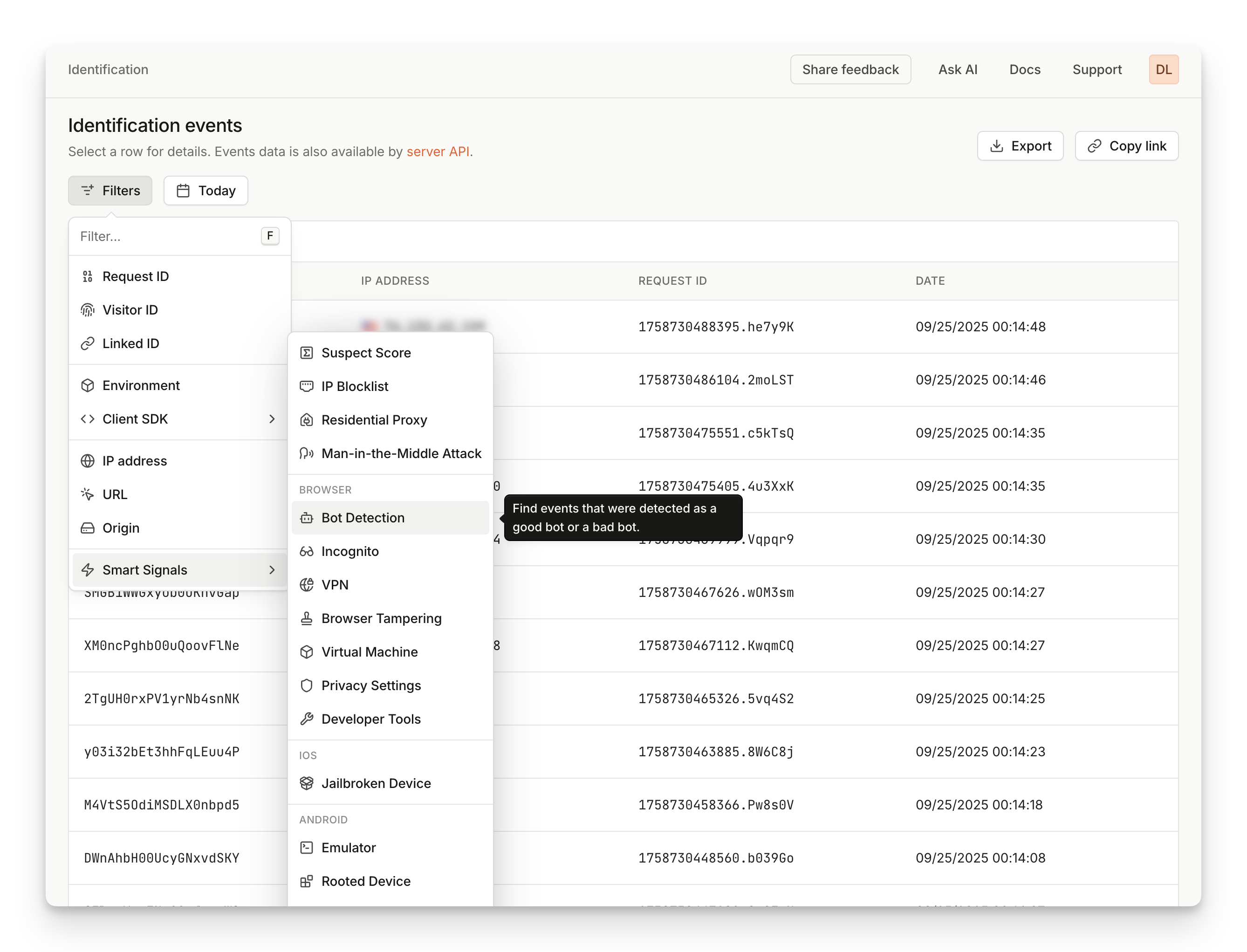
The page can be filtered by a very large number of available filters.
View identification filters
| Filter | Description |
|---|---|
| Request ID | Navigate to an event with specific ID |
| Visitor ID | Find events reported with a specific visitor ID |
| Linked ID | Find events reported with a specific linked ID |
| Environment | Find events associated with a specific environment |
| Client SDK | Find events reported from a specific SDK platform or version |
| IP address | Find events coming from a specific IP address, or an IP address matching a CIDR notation |
| URL | Find events reported from the specific URL or mobile app package identifier |
| 0rigin | Find events reported from a specific domain or mobile app package identifier |
View Smart Signal filters
| Smart signal filter | Description |
|---|---|
| Suspect score | Find events with a suspect score greater than provided value |
| IP blocklist | Find events coming from IP addresses that were found in blocklists |
| Residential proxy | Find events coming from IP addresses that were detected as residential proxy |
| Man-in-the-middle attack | Find events where a request to Fingerprint was intercepted and modified |
| Bot detection | Find events that were detected as bots - good bots or bad bots |
| Incognito | Find events where incognito (or private mode) was detected |
| VPN | Find events that were reported behind a VPN |
| Browser tampering | Find events where browser tampering was detected |
| Virtual machine | Find events where the browser was detected as running inside a virtual machine |
| Privacy settings | Find events where the browser has privacy settings turned on |
| Developer tools | Find events where developer tools were open in the browser |
| Jailbroken device | Find events coming from a jailbroken iOS device |
| Emulator | Find events coming from an Android emulator |
| Rooted device | Find events coming from a rooted Android device |
| Cloned app | Find events coming from a cloned app |
| Frida | Find events coming from an app modified by a Frida toolkit |
| Location spoofing | Find events coming from a mobile device where location was spoofed |
You can view identification events for up to the past 3 months.
Event details page
Clicking on an event on the Identification page opens the Event Details view, which provides thorough information about that specific request.
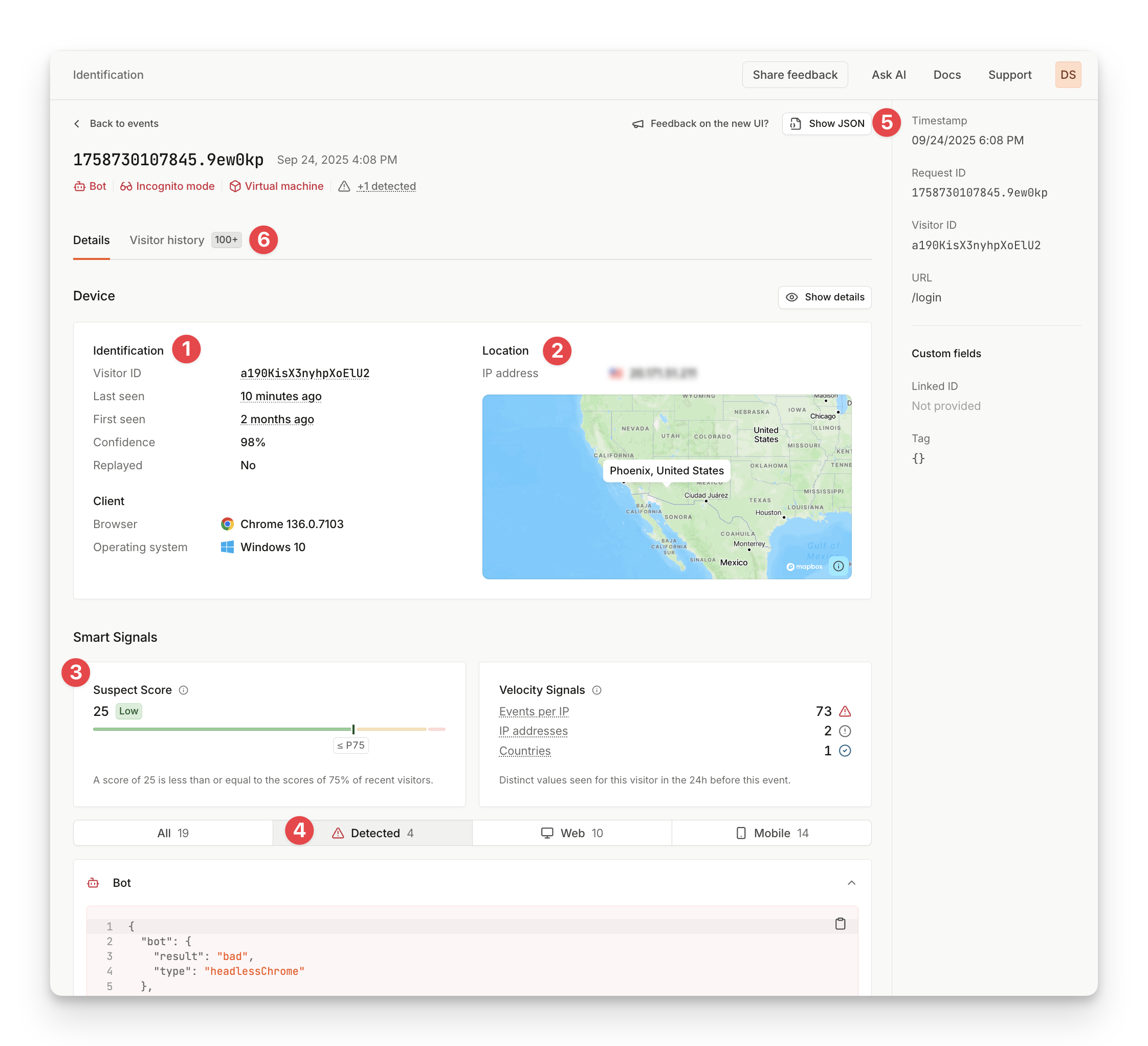
On the page you can find:
- Device and visitor information: basic details about the device, client, browser, operating system, and Visitor ID
- Location: includes the IP address and a visual map of the approximate location
- Suspect Score: displays the score and indicates if it is considered low, medium, or high compared to recent traffic
- Smart Signal details: details for all detected Smart Signals, including velocity signals
- JSON view: explore the entire event by looking through the JSON payload
- Visitor history: allows you to see all events detected from that single Visitor ID, which is a convenient way to find recurring patterns or similar events
Smart Signals Page
The Smart Signals page focuses on providing statistics for Smart Signals, which are identifiers that give you actionable device intelligence for browsers and devices interacting with your application.
You can access the Smart Signals page by visiting Dashboard > Smart Signals.
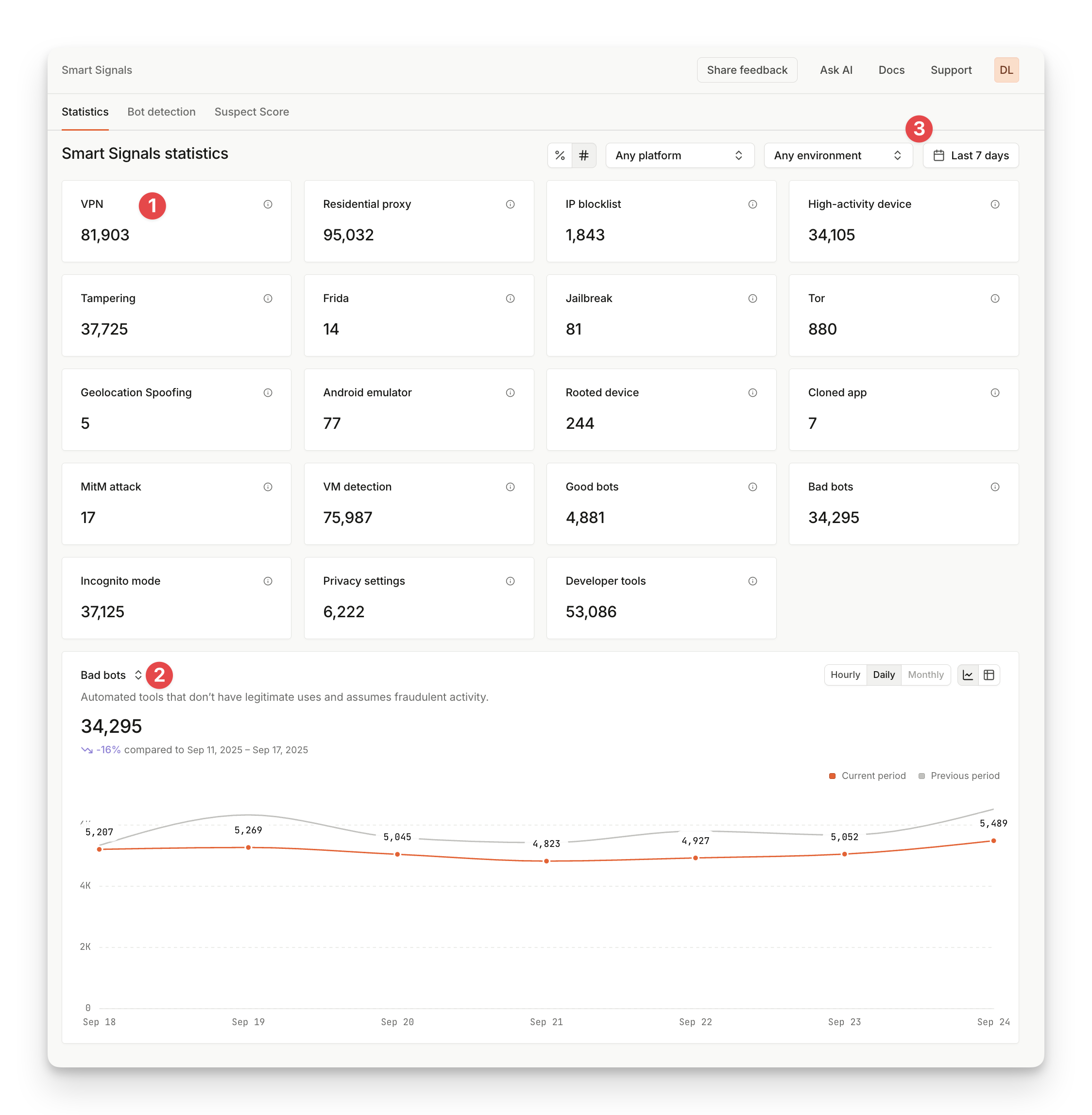
The page features a list of Smart Signals (1) and the number of events where each signal was detected for the selected time period.
On the timeline chart (2), you can plot the selected signal over time, allowing you to compare the trend with previous period.
This page also includes a date range filter, and an environment filter (3).
Bot Detection
By visiting the Bot Detection tab, you can gather more detailed information about detected bots - see the numbers of detected bad or good bots, their trends on the timeline chart, and inspect event details.
Learn more about bot detection.
CSV export
On the Identification page, you can export identification events into a CSV file for use in your own analysis, or integration with external fraud prevention systems.
To get CSV export of your data, visit Dashboard > Identification, and click on Export (1).
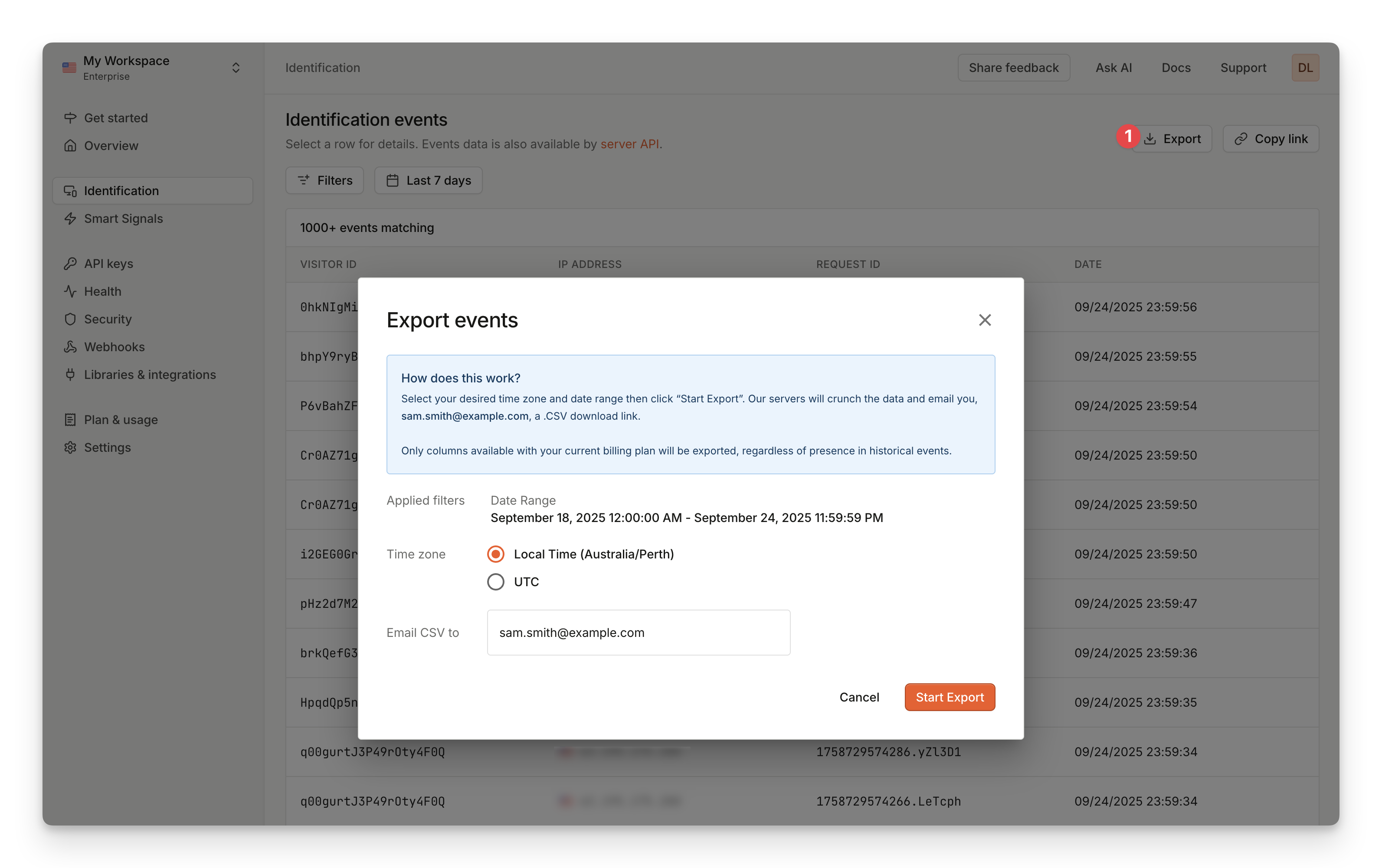
You can filter up to 3 months of data, and any applied filters will also apply on the CSV file. The data provided in the CSV matches the data from the Server API payload, and available columns are determined by your billing plan.
List of CSV columns
- requestId
- tag.requestType
- tag.yourCustomId
- tag
- linkedId
- visitorId
- visitorFound
- timestamp
- time
- incognito
- url
- clientReferrer
- replayed
- ip
- ipLocation.accuracyRadius
- ipLocation.city.name
- ipLocation.continent.code
- ipLocation.continent.name
- ipLocation.country.code
- ipLocation.country.name
- ipLocation.latitude
- ipLocation.longitude
- ipLocation.postalCode
- ipLocation.subdivisions.0.isoCode
- ipLocation.subdivisions.0.name
- ipLocation.timezone
- browserDetails.browserName
- browserDetails.browserFullVersion
- browserDetails.browserMajorVersion
- browserDetails.os
- browserDetails.osVersion
- browserDetails.device
- browserDetails.userAgent
- confidence.score
- confidence.revision
- sdk.platform
- sdk.version
- firstSeenAt.global
- firstSeenAt.subscription
- lastSeenAt.global
- lastSeenAt.subscription
- userAgent
- ipInfo.v4.address
- ipInfo.v4.geolocation.accuracyRadius
- ipInfo.v4.geolocation.latitude
- ipInfo.v4.geolocation.longitude
- ipInfo.v4.geolocation.postalCode
- ipInfo.v4.geolocation.timezone
- ipInfo.v4.geolocation.city.name
- ipInfo.v4.geolocation.country.code
- ipInfo.v4.geolocation.country.name
- ipInfo.v4.geolocation.continent.code
- ipInfo.v4.geolocation.continent.name
- ipInfo.v4.geolocation.subdivisions.0.isoCode
- ipInfo.v4.geolocation.subdivisions.0.name
- ipInfo.asn.asn
- ipInfo.asn.name
- ipInfo.asn.network
- ipInfo.dataCenter.result
- ipInfo.dataCenter.name
- bot.result
- vpn.result
- vpn.confidence
- vpn.methods.timezoneMismatch
- vpn.methods.publicVPN
- vpn.methods.auxiliaryMobile
- vpn.methods.osMismatch
- vpn.methods.relay
- vpn.originTimezone
- vpn.originCountry
- tampering.result
- tampering.anomalyScore
- tampering.antiDetectBrowser
- ipBlocklist.result
- ipBlocklist.emailSpam
- ipBlocklist.attackSource
- clonedApp.result
- factoryReset.time
- factoryReset.timestamp
- jailbroken.result
- frida.result
- rootApps.result
- privacySettings.result
- virtualMachine.result
- suspectScore.result
- mitmAttack.result
- emulator.result
- tor.result
- proxy.result
- proxy.confidence
- incognito.result
- highActivity.result
- locationSpoofing.result
- developerTools.result
- velocity.distinctIp.5m
- velocity.distinctIp.1h
- velocity.distinctIp.24h
- velocity.distinctCountry.5m
- velocity.distinctCountry.1h
- velocity.distinctCountry.24h
- velocity.events.5m
- velocity.events.1h
- velocity.events.24h
- velocity.ipEvents.5m
- velocity.ipEvents.1h
- velocity.ipEvents.24h
- velocity.distinctLinkedId
- velocity.distinctIpByLinkedId
- velocity.distinctVisitorIdByLinkedId
- rawDeviceAttributes
Updated about 1 month ago
